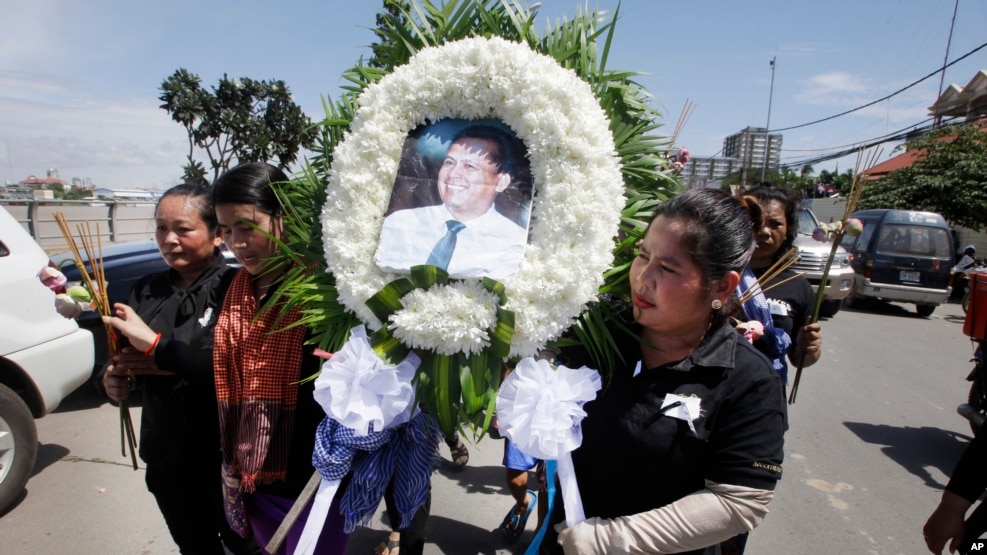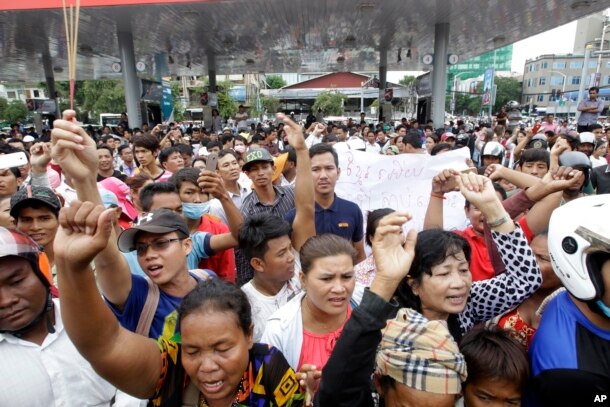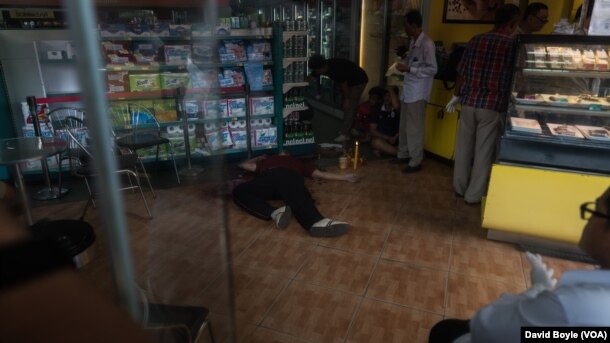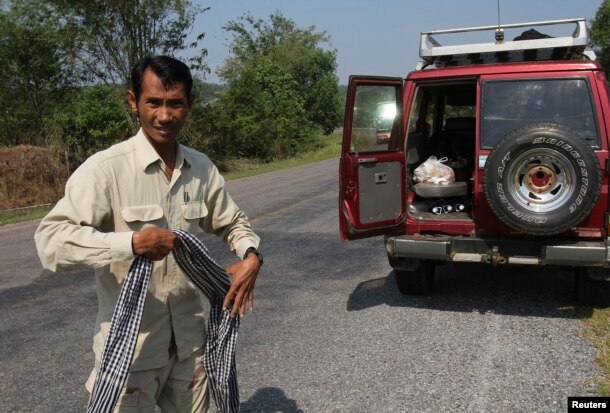 |
| Cambodian community activists carry a wreath during the funeral procession of government critic Kem Ley in Phnom Penh, July 11, 2016. |
Prominent Critic's Killing Raises Political Stakes in Cambodia
VOA | 12 July 2016
PHNOM PENH —
The killing of high profile activist and political commentator Kem Ley has shocked Cambodians, angered the opposition, and raised the political stakes in a country with a tragic history of assassinations and an intolerance of dissenting voices.
Hundreds have been jailed and many killed in a difficult peace since the final shots in Cambodia's long-running civil wars were fired almost 18 years ago, leaving behind a nasty culture of violence. Analysts said Kem Ley's death symbolizes that culture and the recent crackdown on dissent by Prime Minister Hun Sen.
Ley's death was alarmingly similar to the notorious murder of trade unionist Chea Vichea in 2004 and reminiscent of the 2012 killing of Chut Wutty, an environmentalist shot dead while working with two journalists.
Neither case has been resolved satisfactorily, raising fears the latest high profile murder of a civil society activist would again be blighted by official obfuscation and an unwillingness by the police to challenge authority.
This point was made by John Kirby, spokesman for the U.S. State Department, who said Washington was deeply concerned by the death of the 45-year-old activist.
“We are following developments in this case closely, noting the Cambodian government's call for an investigation, and urge that authorities ensure this process be thorough and impartial,” he said.
Reaction

Kem Ley, a Cambodian analyst, discusses the meaning of color revolution and freedom of expression in Cambodia during Hello VOA call-in show in Phnom Penh, June 30, 2016. (Lim Sothy/VOA Khmer)
In perhaps his last interview, conducted Friday by VOA Khmer service, Kem Ley was quite vocal in regards to a highly sensitive report from London-based corruption watchdog Global W
itness that last week valued Hun Sen's family wealth at a minimum of $200 million.
He told VOA Khmer the report provided clear information about how Cambodia really works and should be used to benefit the country through investigations by the anti-corruption unit, the National Audit Authority, and the National Assembly.
“How far are they willing to go? I doubt it if they do, but even if they don’t, it still is a historical evidence under a person’s leadership,” he said, referring to Hun Sen and the report.
It's a touchy issue in a country mired by poverty with the wealth divide becoming an increasingly hot election topic among voters.
Global Witness added its voice to the growing chorus of international condemnation of Ley's death and called for an investigation “that will ensure that the real perpetrators are brought to justice, not just the hit men.”

Cambodians shout slogans outside a shopping mall where prominent political analyst Kem Ley was shot dead in Phnom Penh, Cambodia, July 10, 2016.
Long history of political assassinations
Spokeswoman Josie Cohen said Cambodia had a long history of political, human rights and labor activists being killed.
Keith Loveard, a regional risk analyst with Jakarta-based Concord Consulting, said violence in Cambodia was an issue of concern for the Association of Southeast Asian Nations (ASEAN) adding the current political climate was similar to the political assassinations of the Philippines and Indonesia during the 1980s and 1990s.
But he added that political assassinations could prove to be more damaging for a government intent on ruling through violence and intimidation.
“I think there is already some concerns about the directions of Cambodia and this will only accentuate those directions,” he said in regards to the killing.
The Overseas Press Club of Cambodia (OPCC) said Kem Ley was a trusted and often quoted source for journalists.
“Well I think it's a worrying time for Cambodia,” OPCC board member Rupert Winchester said. “Kem Ley was a respected political commentator and Cambodia has lost an important political voice.
“At the OPCC we're extremely concerned this killing will have a quietening effect on freedom of speech nation-wide, which is crucial ahead of next year's commune elections,” he said.
A government spokesman declined to comment.
Death not unprecedented
At the latest murder scene, a Caltex gas station on a busy corner of the capital, hundreds of protesters and at least one policeman simply said they did not believe the official explanation for Ley's death.

Police survey the crime scene where Kem Ley was shot dead while family members pray next to his dead body, July 10, 2016.
One suspect was arrested immediately after the killing and police said the motive was a debt for $3,000. In a recorded confession, the suspect gave his name as Chuab Samlab, which translates to “meet kill” in Khmer.
Police say they are looking for a second assailant.
Kem Ley was shot twice in broad daylight, from behind with a high precision hand gun, which is not normally associated with street thugs and debt collectors.
Chea Vichea was also shot twice in broad daylight. Two suspects were tried, a process widely slammed by human rights groups who say both men were used as scapegoats.
Their case ran nine years before being dropped because of a lack of evidence. Investigations into the deaths of two other two unionists were inconclusive, and activists say a probe into the killing of Chut Wutty was closed without justice rendered.

FILE - Chut Wutty, Director of the Natural Resource Protection Group, walks in Koh Kong province, Feb. 20, 2012. The prominent anti-logging activist, who helped expose a secretive state sell-off of national parks, was fatally shot on April 25, 2012 in a remote southwestern province, said police.
Future in politics
Kem Ley was as much an outspoken critic of Hun Sen and his ruling Cambodian People's Party (CPP) as he was of the opposition Cambodian National Rescue Party (CNRP). He founded the Grass Roots Democracy Party almost a year ago.
Commune elections scheduled for mid-2017 and general elections due a year later are shaping-up as a bloody affair after the CPP returned to power in the last election with a sharply reduced majority.
“Much is going on and people don't want to talk about it,” said one local academic who declined to be named said. “Kill one person and everyone shuts up, but at the end of the day it's about people who owe their livelihoods to the CPP and they will do anything in their power to keep that power.”
Two CNRP politicians were bashed outside the National Assembly in October and a further 19 politicians and supporters have since been detained.
Additionally, CNRP leader Sam Rainsy has fled into self-imposed exile, while authorities are threatening his deputy Kem Sokha with arrest over a sex scandal.


No comments:
Post a Comment